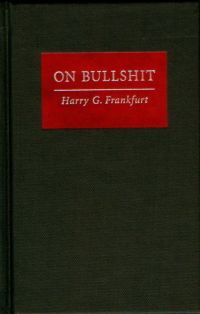
On Bullshit
by Harry G. Frankfurt (1929-2023)
“One of the most salient features of our culture is that there is so much bullshit.” Bullshit can refer to a number of things, including pointless tasks or requirements, but the main topic of this book is the widespread disregard for truth in speech and writing.
Frankfurt makes a distinction between lying and bullshitting. “It is impossible for someone to lie unless he thinks he knows the truth. Producing bullshit requires no such conviction.”
“The liar is essentially someone who deliberately promulgates a falsehood… The essence of bullshit is not that it is false but that it is phony… to bluff one’s way through (something) by talking nonsense… Although it is produced without concern with the truth, it need not be false. The bullshitter is faking things. But this does not mean that he necessarily gets them wrong.”
“Someone who lies and someone who tells the truth” are both responding to the facts. “The response of the one is guided by the authority of the truth, while the response of the other defies that authority and refuses to meet its demands. The bullshitter ignores these demands altogether… He pays no attention to it at all. By virtue of this, bullshit is a greater enemy of the truth than lies are.”
“So why is there so much bullshit?”
“Bullshit is unavoidable whenever circumstances require someone to talk without knowing what he is talking about. Thus the production of bullshit is stimulated whenever a person’s obligations or opportunities to speak about some topic exceed his knowledge of the facts that are relevant to that topic. This discrepancy is common in public life, where people are frequently impelled–whether by their own propensities or by the demands of others—to speak extensively of which they are to some degree ignorant. Closely related instances arise from the widespread conviction that it is the responsibility of a citizen in a democracy to have opinions about everything, or at least everything that pertains to the conduct of his country’s affairs.” This reminds me of the Dunning-Kruger effect, a cognitive bias wherein incompetent people are overconfident.
“The contemporary proliferation of bullshit also has deeper sources, in various forms of skepticism which deny that we can have any reliable access to an objective reality… One response to this loss of confidence has been a retreat from the discipline required by dedication to the ideal of correctness to a quite different sort of discipline, which is imposed by pursuit of an alternative ideal of sincerity.” This implies that political correctness and the academic climate of no wrong answers have played a role in making bullshit a socially acceptable alternative to truth.
The author makes an amusing analogy between hot air and excrement. “Just as hot air is speech that has been emptied of all informative content, so excrement is matter from which everything nutritive has been removed.” However, given that manure is widely used as fertilizer, I think this statement is an unintentional example of bullshit.
Frankfurt contradicts himself when he states on page 53 that bullshit “is less a matter of craft than of art. Hence the familiar notion of the ‘bullshit artist.’” On page 22 he made the opposite assertion. “The realms of advertising and of public relations, and the nowadays closely related realm of politics, are replete with instances of bullshit so unmitigated that they can serve among the most indisputable and classic paradigms of the concept. And in these realms there are exquisitely sophisticated craftsmen who—with the help of advanced and demanding techniques of market research, of public opinion polling, of psychological testing, and so forth—dedicate themselves tirelessly to getting every word and image they produce exactly right.”
While only 67 4×6-inch pages, the book contains a lot of extraneous rambling before the author gets to his point. For example, on page five Frankfurt refers to Max Black, author of The Prevalence of Humbug. “Black suggests a number of synonyms for humbug, including the following: balderdash, claptrap, hokum, drivel, buncombe, imposture, and quackery. This list of quaint equivalents of is not very helpful.” If it is not helpful, then why bring it up? Frankfurt is a master of verbosity. I suspect this was a useful skill in acquiring his Ph.D. in philosophy, but it is not a quality of good writing.
The content of this book was originally published as a 16-page essay. The hardcover edition has some giggle value as a gag gift. Or leave a copy on your coffee table to start a conversation.
Frankfurt, Harry G. On Bullshit. Princeton, New Jersey: Princeton University Press, 2005. Buy from Amazon.com
Disclosure: As an Amazon Associate I earn from qualifying purchases.
10 thoughts on “On Bullshit”
Comments are closed.